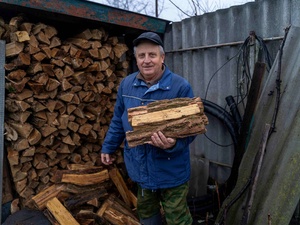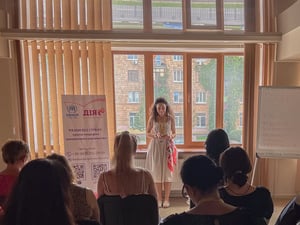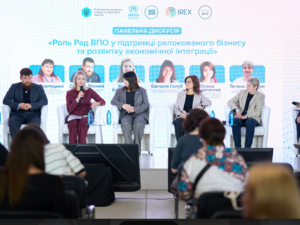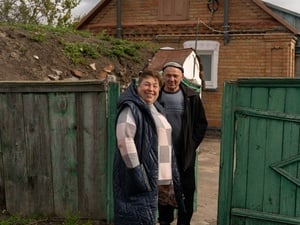Valentyna: “My home is where I feel free”
Valentyna: “My home is where I feel free”

Valentyna, 39, has been displaced twice. When the war broke out in eastern Ukraine in 2014, she first fled Luhansk to Kyiv with her then five-year-old son, Nazar, who has a disability. At the start of the full-scale invasion in 2022, she was displaced to Lviv where she started to support other families who also had relatives with disabilities, to evacuate to safer places.
Now, Valentyna is a mother of two sons and heads the NGO “Litay” (Fly) that supports displaced mothers of children with disabilities. She still keeps a Ukrainian national flag, one of the few items she took when she left her home in Luhansk 11 years ago.
Interviewed by Iryna Tymchyshyn, UNHCR Ukraine.

“Back in 2014, I already understood that the war would not end quickly — that it wouldn’t just last“ month or two. I remember the day when pro-Russian forces stormed the regional administration building in Luhansk. We were at a peaceful rally, and a crowd of aggressive people came towards us. They tore the Ukrainian flags from our hands, threw them on the ground, and trampled them. That was incredibly painful — because this is your land, your country, your family. And someone comes to your street and calls themself “the master”.
Staying in Russian-occupied Luhansk while preserving a Ukrainian identity was dangerous. In June 2014, my five-year-old son Nazar — who has a disability — and I left for Kyiv for medical treatment and never returned. I understood there would be no going back until Luhansk will be returned under Ukraine’s control again.

“My parents also left, and since then, I have not returned to Luhansk, not even once. I have not visited my home. I knew I had to build a new life elsewhere. It became easier once I decided to break the physical attachment to a building and stop identifying "home" as just a place. My home is where my family is. Where I feel free. I live in a one-room apartment in Kyiv, but that’s not what matters. What matters is that I am in my own country.
At first, I lacked social interaction in Kyiv — especially as a mother of a child with a disability. But over time, I started connecting with other displaced women in similar situations. In 2020, I was invited to work in the Office of the Commissioner for the Rights of Persons with Disabilities.
Before the full-scale invasion, I had a strong sense that something was coming — and saving my son became the priority. We left Kyiv, which was surrounded by Russian troops, and went to Lviv. We stayed there for almost six months, helping to evacuate families with children or relatives with disabilities.
In the third month of the war, I became pregnant and gave birth to another son, Myron, in December 2022. By then, we had returned to Kyiv. On the second day after his birth, we had to take shelter from shelling in the maternity hospital’s basement. There were heavy attacks at the time and widespread blackouts ... That’s how Myron’s first days of life began.
He is two years old now. He does not yet understand what war is. He barely speaks. But when we shelter in the hallway during shelling or hear the air raid sirens while walking in the park, I see the question in his eyes: “What is this? Why do we have to run and hide?” We try not to walk too far from home, so we do not have to run to find shelter. During massive attacks, we sometimes leave Kyiv. But as Myron grows older, it is becoming harder to explain the reality we live in.
I know the moment will come when I have to find the words to explain to him what war is. But I also know he is not ready yet.
“My home is where my family is. Where I feel free”.
“What helps me stay grounded emotionally is my work. I lead the NGO “Litay” (which means “Fly”), which we founded in 2022 to support displaced mothers raising children with disabilities. The life paths of these women are not easy ones. But they can be walked in different ways — in constant despair, or with the understanding that this is your life, and it is worth living.
Our goal is to provide support that helps these women restore their inner strength and find the inspiration and motivation to keep going. “Litai” is about wings, about inspiration, about not giving up and continuing forward.
But my greatest inspiration and motivation are my sons. How can I not believe in a better future when I am raising children? There is no time for despair when two-year-old Myron needs all my attention. His future should be in a peaceful country — one without war.”










